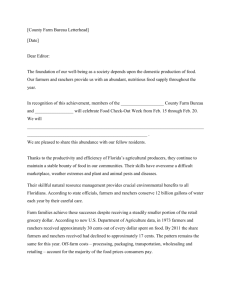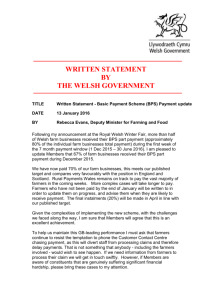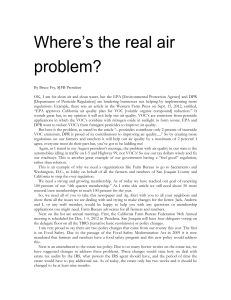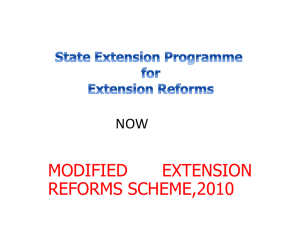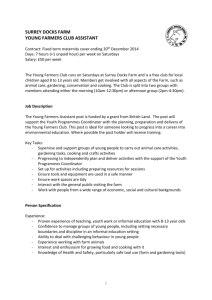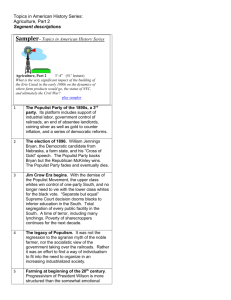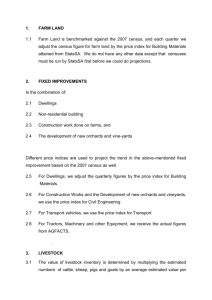Federal Farm Policy Letter From Antonio Gonzalez
advertisement
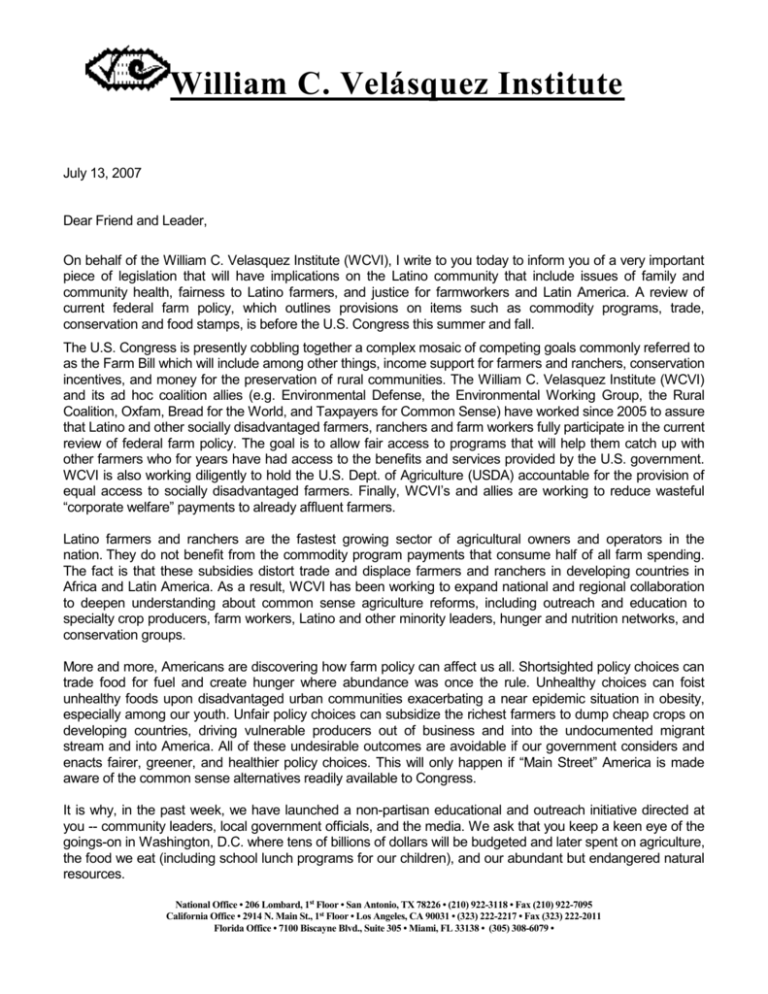
William C. Velásquez Institute July 13, 2007 Dear Friend and Leader, On behalf of the William C. Velasquez Institute (WCVI), I write to you today to inform you of a very important piece of legislation that will have implications on the Latino community that include issues of family and community health, fairness to Latino farmers, and justice for farmworkers and Latin America. A review of current federal farm policy, which outlines provisions on items such as commodity programs, trade, conservation and food stamps, is before the U.S. Congress this summer and fall. The U.S. Congress is presently cobbling together a complex mosaic of competing goals commonly referred to as the Farm Bill which will include among other things, income support for farmers and ranchers, conservation incentives, and money for the preservation of rural communities. The William C. Velasquez Institute (WCVI) and its ad hoc coalition allies (e.g. Environmental Defense, the Environmental Working Group, the Rural Coalition, Oxfam, Bread for the World, and Taxpayers for Common Sense) have worked since 2005 to assure that Latino and other socially disadvantaged farmers, ranchers and farm workers fully participate in the current review of federal farm policy. The goal is to allow fair access to programs that will help them catch up with other farmers who for years have had access to the benefits and services provided by the U.S. government. WCVI is also working diligently to hold the U.S. Dept. of Agriculture (USDA) accountable for the provision of equal access to socially disadvantaged farmers. Finally, WCVI’s and allies are working to reduce wasteful “corporate welfare” payments to already affluent farmers. Latino farmers and ranchers are the fastest growing sector of agricultural owners and operators in the nation. They do not benefit from the commodity program payments that consume half of all farm spending. The fact is that these subsidies distort trade and displace farmers and ranchers in developing countries in Africa and Latin America. As a result, WCVI has been working to expand national and regional collaboration to deepen understanding about common sense agriculture reforms, including outreach and education to specialty crop producers, farm workers, Latino and other minority leaders, hunger and nutrition networks, and conservation groups. More and more, Americans are discovering how farm policy can affect us all. Shortsighted policy choices can trade food for fuel and create hunger where abundance was once the rule. Unhealthy choices can foist unhealthy foods upon disadvantaged urban communities exacerbating a near epidemic situation in obesity, especially among our youth. Unfair policy choices can subsidize the richest farmers to dump cheap crops on developing countries, driving vulnerable producers out of business and into the undocumented migrant stream and into America. All of these undesirable outcomes are avoidable if our government considers and enacts fairer, greener, and healthier policy choices. This will only happen if “Main Street” America is made aware of the common sense alternatives readily available to Congress. It is why, in the past week, we have launched a non-partisan educational and outreach initiative directed at you -- community leaders, local government officials, and the media. We ask that you keep a keen eye of the goings-on in Washington, D.C. where tens of billions of dollars will be budgeted and later spent on agriculture, the food we eat (including school lunch programs for our children), and our abundant but endangered natural resources. National Office • 206 Lombard, 1st Floor • San Antonio, TX 78226 • (210) 922-3118 • Fax (210) 922-7095 California Office • 2914 N. Main St., 1st Floor • Los Angeles, CA 90031 • (323) 222-2217 • Fax (323) 222-2011 Florida Office • 7100 Biscayne Blvd., Suite 305 • Miami, FL 33138 • (305) 308-6079 • Page 2 February 12, 2016 I also ask you to consider two bills currently before the U.S. House of Representatives which have the capacity to start making right so much of what is wrong with expenditures on agriculture, food and our natural resources that in the past has only amounted to more welfare for large corporations and the very rich. They are the NOURISH Act (HR 2401), presented by Rep. Joe Baca from California, and the Healthy Farms, Foods and Fuels Act (HR 1551), presented by Rep. Ron Kind from Wisconsin. Through “NOURISH” Rep. Baca proposes: Anti hunger and nutritional assistance programs. To improve opportunities for Latino and other socially disadvantaged farmers and ranchers. To improve working and living conditions for farmworkers in this country. To protect and assist migrant and seasonal farmworkers. To secure USDA loans for socially disadvantaged farmers. Technical assistance. A guarantee of fair contracts for crops. And Rep. Kind’s “HEALTHY” Act proposes to: Increase from $200 million to $2 billion annual loan guarantees for renewable energy development on farms. Expand programs that provide local, healthy food choices to our school children and dramatically expand coupon programs that allow elderly and low income Americans to shop at farmer’s markets. Increase incentives by $3 billion a year for farmers and ranchers to protect drinking water supplies and make other environmental improvements. Provide funding to restore nearly 3 million acres of wetlands. Provide funding to protect 6 million acres of farm and ranch land from sprawl. Between the two of them America may start making right what has historically been a system of discrimination and waste and proven to be unfriendly to Latino and other socially disadvantaged farmers and ranchers. Approximately 90 percent of Latino farmers and ranchers do not benefit from the commodity program payments, which consume half of all spending in the Farm Bill budget. Also, Latino farmworkers, who labor under the hot sun to produce much of the food we eat, have been and continue to be subjected to unfair wages and unsafe and unhealthy working conditions. Finally, over the years federal agriculture programs and policies have had an adverse impact on the health and nutrition of Latinos. The result is disheartening: 20 percent of Latinos face food insecurity each year resulting in problems dealing with their health and well-being. It is another important reason why access to affordable, nutritious foods is a high priority in the 2007 Farm Bill debate and WCVI is at the forefront of this fight. Like I said, let us make 2007 the year we start making right what has been so wrong in the world of agriculture, food and our natural resources. To learn about WCVI’s efforts please contact Alvaro Fernandez at 305-308-6079, Matt Garcia at 210-9223118 or Ruben Villarreal at 323-363-1863 or you may visit www.wcvi.org. For more information on the 2007 federal farm policy review and reform process contact your U.S. Representative at the U.S. House of Representatives at (202) 224-3121. Sincerely, 2 Page 3 February 12, 2016 Antonio González, President William C. Velasquez Institute 3
